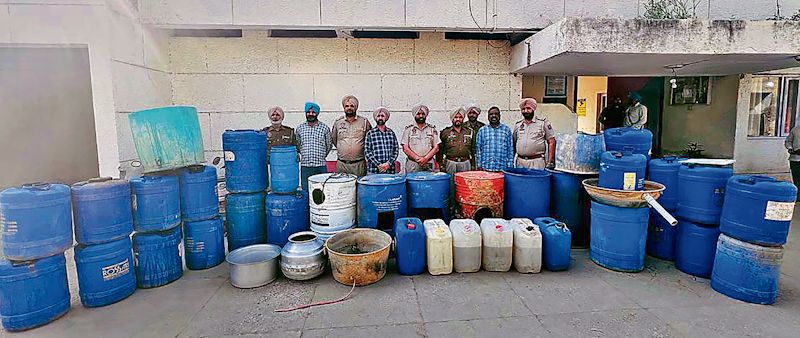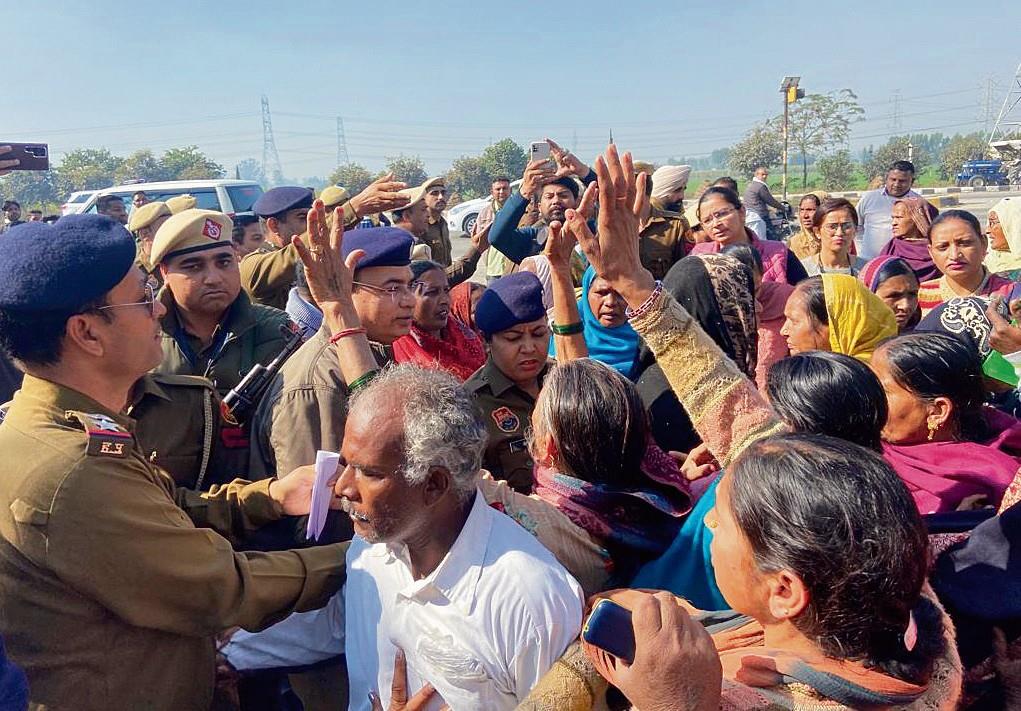
An illicit liquor distillery operation that was busted in Amritsar. Tribune file photo
Aman Sood in Patiala
A few years back, a young Station House Officer tried to make the most of a boat trip to Harike in Ferozepur district, where the Beas and Sutlej rivers meet, as he briefed about the alarming levels of pollution in the area. The police personnel made three pit-stops on patches of land in the water channels and recovered hundreds of litres of hooch — cheap, inferior-quality, illicit liquor — packed in polythene in the muddy waters. “Such routine raids and recoveries keep you in the good books of seniors. The easiest arrest is that of bootleggers,” he said. The incident perhaps best exemplifies why illicit and spurious liquor continue to be made and sold in Punjab with impunity.

When tragedy strikes, such as the deaths recently of 21 men in Sangrur after consumption of spurious liquor, there is a clamour for firm action. Within days, almost all districts of the state had multiple FIRs and recoveries of illicit liquor, with active participation of the excise and police officials. “Mind you, it is only hooch brewers who are caught,” says an industry insider. “The local cops or excise officials are spared. Can any operation, small or big in scale, run without their connivance, or political patronage? How difficult can it be for the state apparatus to keep track of ethyl alcohol or methyl alcohol supplies?” he asks.
The key ingredient of an alcoholic beverage is ethanol. Large amounts of methanol, a chemical used in industrial products, were found in the liquor that was consumed in Sangrur, according to Gurinder Singh Dhillon, head of the special investigation team probing the deaths. Methanol was also the key ingredient in the spurious liquor that led to around 120 fatalities in Tarn Taran, Gurdaspur and Amritsar in 2020.

Police officials who probed the two tragedies say extra neutral alcohol (ENA), which is an ethanol grade of high purity, is usually pilfered by tanker drivers en route to and from distilleries in connivance with highway dhaba owners. It is then shown as lost during transportation.
In a few cases, small-time chemical units sell methanol to bootleggers. They opt for denatured spirit — used in the paint industry — to fill the gap if there is a fall in the quantity of ENA pilferage.
Typically, ingredients that go into making hooch include lahan (raw material); fermented orange and jamun; coarse jaggery; yeast extracted from local plants; wild berries, pears, apricot and peaches; unfiltered or river/pond water; minute traces of methanol, and sometimes organic waste, dead rodents, even lizards and battery acid for that “extra kick”.
The questions that emerge are many. Is the government really serious in checking the illegal production and sale of liquor? When it is well known that a periodic crackdown does not lower the risks or act as a deterrent, what is the way forward? Why does the consumption of spurious liquor continue despite the spate of fatal tragedies? Do excise policies downplay quality issues when it comes to liquor the poor can afford? How is the pilferage of ENA and denatured spirit so easy?
A liquor contractor explains: “In 2000, a daily-wager would on an average earn Rs 300-350. He could get high spending Rs 30 on half a bottle of Punjab Medium Liquor (licensed country-made desi daaru). With successive governments eyeing an increase in revenue and amplified political greed, the liquor contractors were left with no alternative but to increase prices. Today, when the daily-wagers earn Rs 550 to Rs 600, a liquor bottle costs anything above Rs 200. Such pricing opens doors for experimenting with cheap local-made liquor, often called moonlight or hooch.”
This illegally-prepared hooch, with no check on the ingredients, can be available for as low as Rs 70. “Sometimes, even methanol is added,” says the contractor.
But is cheap pricing and bootleggers’ greed the most plausible explanation for the lure of hooch? A former IPS officer, who served for over a decade in the border belt, is convinced it is. “Spurious liquor is brewed in obscure places and there are no taxes or checks on the quality of ingredients and the outcome. It needs no fancy packing or vends to sell. The only USP is that it is much cheaper,” he says.
Because illicit brewing is unscientific, hooch brewers, he adds, inadvertently or irresponsibly mix excessive amounts of methanol in the liquor every once in a while, leading to mass deaths.
Bootleggers cater to a perpetual demand for cheap alcohol among habitual users and addicts, and the illicit industry thrives only because law enforcers at the local level allow it to, admits the retired IG. “Haftas (weekly bribes) are taken for letting illegal brewing joints operate and raids are only conducted when there is pressure from the top. A crackdown is always possible if they want to, but this is a very lucrative business with a very high turnover,” he points out.
There are some like Amarjit Singh Mann, a social activist from Sangrur, who feel that cheap pricing alone cannot explain the demand for illicit hooch. “People want alcohol because they get addicted, and I have seen people seek out cheap hooch even if they can afford licensed country liquor,” says Mann, who runs an NGO, Scientific Awareness and Social Welfare Forum, which has been seeking a ban on liquor in Punjab for the past 15 years. “Hooch is a stronger drink and addiction makes people want an extra kick. Governments are bothered about revenues and take pride when they declare that excise revenues have increased.”
There are technical issues at play too. According to police officials, as a routine practice, when illegally transported methanol or ethanol is recovered, the Excise Department gets a case registered at the local police station. However, the investigations continue to remain with the excise wing — which has a separate police wing to probe such cases. In many such cases, the kingpins are never arrested and a challan is presented against those who get arrested. They get bail and continue in the same profession. It’s an unending cycle, with fatal consequences.
Killer trap
- As many as 146 deaths attributed to spurious liquor have been reported in Punjab in the past four years — 120 in Tarn Taran, Gurdaspur and Amritsar in 2020, and 21 in Sangrur in 2024, besides five more suspected deaths in the past three years.
- Majority of deaths go unreported because the authorities and family members are unable to link it to the intake of spurious liquor. Thus, the police complete the proceedings under Section 174 of CrPC (the scope of which is confined to determining whether the death was unnatural or under suspicious circumstances). A compromise is struck.
Deadly concoction
- Sewage, industrial waste, water from stagnant ponds and canals carrying heavy pollutants or chemicals are some of the adulterants which go into the making of illicit liquor.
- To add an extra kick, bootleggers have started adding lizard skin, Alprazolam tablets and muscle relaxants. Water collected from nearby sources is laced with chemicals and then filled in tyre-tubes, which are buried under hot sand for over a week.
- “Water used in brewing cheap liquor is compromised. We were shocked to see dead lizards, sewage and even tyres floating in illicit liquor containers,” says a Punjab cop who has been a part of several such raids. “In most cases, ASIs deal with such recoveries while SHOs hardly visit the spot. Following the recent deaths, things have changed, but not for long.”
The way forward
- The primary focus should be to ensure that ‘certified liquor’ is within reach. For that, some brands can be promoted at cheaper prices and the government should strictly control their sale price.
- Implement with all seriousness the decision of the Punjab government to act against the SHO and excise officials under whose jurisdiction any hooch is recovered, sold or a tragedy takes place.
- Curb the practice to catch certain bootleggers but allow free access to others with political connections.
- Once an official is caught helping bootleggers, complete the departmental probe within the stipulated time and make the findings public.
Join Whatsapp Channel of The Tribune for latest updates.


























